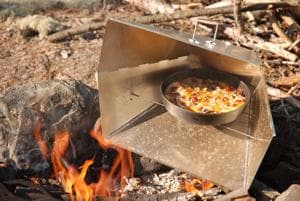Baking in the Bush
Baking such things as bread, brownies or bannock on a trip does a lot for me personally. The act is beyond just making things that taste awfully good. And yes, baking while on a trip does ad an incredible amount of flavor to group dynamics, even a significant moral booster at times. But eating well and making friends are not the major reasons I do it. I bake to relax. The act itself seems to unwind the tensions of the day - both physical and mental - like no other. It always has, but it's not until recently I figured out why.

It comes down to the simple fact that there are two types of camp chefs: cooks and bakers. Well, there's also the ones who can't do either and just boil up mush to make more miles but that's a different subject all together. Cooks are the right-brain types, ones who put thought and passion to the ingredients while they are in the process of cooking. Bakers are the left-brain types, the ones who put all there enthusiasm into the creation of what they are about to cook. I compare my art of baking to pottery. I have more fun forming what's going to be placed in the oven and anticipate its unusual but always unique outcome.
Baking things like pre-mix brownie mix or carrot cake is a good primer but baking bread is the ultimate. It takes a lot pf practice to prepare the perfect loaf, especially when it comes to the crucial step of mixing in the leavening agent to the dough. It what "puffs it up." The kneading process (mixing the leavening agent and then literally punching the heck out of the dough with your fist) is necessary to create tiny bubbles and allow the dough to rise.
Baking powder or baking soda work as well but only under heat and reacts only during the baking process. For pre-baking agents, however, yeast is the most common.
When yeast is added, a chemical reaction occurs which releases gas slowly throughout the mixture of dough, which in turn gets trapped and in an attempt to escape forces the dough to rise.
Yeast needs warmth to produce the gas and the best source while camping is sunlight (warm coals of a campfire could be used in a pinch). The yeast is also activated by luke- warm water and sugar.
Small packets of yeast are perfect to take along camping. Simply sprinkle the desired amount (one small packet per loaf of bread) over a ½ cup of luke-warm water (the temperature of bath water), add a couple pinches of sugar, mix and then set aside in a warm place until your ready to mix the dough (flour and water).When the yeast is frothy and expanding, its good to use.
What you bake in is a personal choice. I used to use the Outback Oven. It's a great camp gadget that makes it possible to bake on a camp stove. But I always found that the end product had a bit of a tin taste to it, probably because of the asbestos-type cover that's used. Recently, however, I purchased a non-commercial one through Wooden Canoe Heritage Associationmember Rob Stevens (rstevens@mountaincable.net). It was made in Sweden by another WCHA member - Svanie Freden. The model is unlike all the others I've tried over the years. It's extremely light-weight (even lighter then an outback oven) and bakes incredible well (pictured above and demonstrated in video below).
But you don't need any of the fancier gadgets to bake, as long as you packed two pots and a plastic bag. Here's how to do it:
- In a heavy-duty freezer Zip-lock bag mix flour, sugar, yeast, dry powdered milk, oil and hot water.
- Squeeze upper part of bag to force out the air and then shake and work bag with fingers to blend ingredients.
- Remove from bag and knead on floured surface.
- Place formed bread back in bag and let it rise for ten minutes.
- Fill the larger of the two pots with 1 inch of water, then rest second pot on top of water (this process acts as a heat diffuser).
- Place the bagged bread in the smaller pot and loosely roll down the top of the bag (don't seal it).
- Place a lid on the larger pot and boil until its baked (should take 20-30 minutes)
Check out Kevin Callan's web site: kevincallan.com
Kevin Callan is the author of 11 books including his latest "Wilderness Pleasures" and "The Happy Camper." A regular keynote speaker at major North American canoeing and camping expos for over 20 years, he has received three National Magazine Awards and four film awards, including top award at the prestigious Waterwalker Film Festival. Callan lives in Peterborough, Ontario, birthplace of the modern-day canoe.
Related Articles
I've been busy lately rearranging my cooking essentials: the little tools that I can't do without. Of…
"All day I've faced a barren waste without the taste of water, cool water.Old Dan and I with throats…
Who says that cooking with herbs should be reserved only for home cooks and that campers shouldn't take…
Christmas is just around the corner and you are again left wondering what to offer your favorite…

